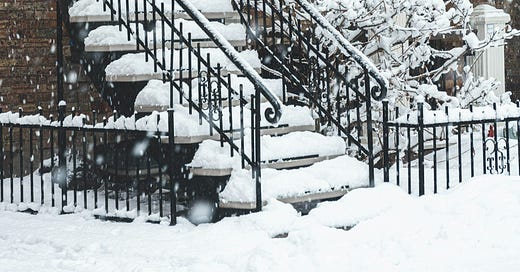And now let us believe in a long year that is given to us, new, untouched, full of things that have never been, full of work that has never been done, full of tasks, claims, and demands;
and let us see that we learn to take it without letting fall too much of what it has to bestow upon those who demand of it necessary, serious, and great things.
— Rainer Maria Rilke, in a letter to his wife Clara Rilke-Westhoff, January 1, 1907 (h/t)
Happy new year and welcome to my first essay of 2025!
It was 15°F in Montreal when I stepped into a neighborhood flower shop. What I encountered there wasn't just a business transaction – it was a masterclass in the difference between doing a job and practicing a craft.
The shop itself was unassuming: a local establishment that had served the community for 57 years, its walls adorned with family photos suggesting a business passed down through generations. I was just another customer, likely a one-time visitor, picking up flowers for a friend's birthday before heading back to Miami.
What unfolded next revealed something profound about the nature of work itself.
The florist's approach was methodical, but not in the rigid way of corporate protocols. She asked about the occasion, my budget, and – most intriguingly – how long it would be before I delivered the flowers. This last question caught my attention. When I mentioned it would be less than five minutes, she nodded, already calculating what this meant for how she would prepare the bouquet.
Had the delivery time been longer, she explained, she would have used a salt sponge to maintain freshness. For my situation, she orchestrated a different type of protection: first, a transparent plastic cover, then thick drafting paper, and finally, an outer plastic bag. Each layer was a defense against the brutal Montreal winter, ensuring the flowers would arrive as vibrant as they were in her shop.
What struck me wasn't just what she did, but what she didn't have to do.
In our age of optimization and efficiency, there was a much simpler path available: wrap the flowers in basic plastic, hand them over, complete the transaction. After all, I wasn't a regular customer. I wasn't going to become one. There would be no Yelp review, no repeat business to cultivate. The bare minimum would have been perfectly acceptable.
But that's not what happened in that shop on that cold Montreal afternoon.
Instead, I witnessed someone practicing their craft – someone for whom selling flowers wasn't just a transaction but an expression of identity. The florist's actions weren't driven by customer retention metrics or service protocols. They emerged from a deeper place: the space where work transcends necessity and becomes craft.
This distinction – between the transactional and the craftsperson's approach – draws a line through nearly every field of work. There’s a spectrum of engagement:
At one end, there's the minimum viable effort – the bare essentials required to complete the task.
A step above that lies the professionally competent – doing the job well, meeting all expectations.
But beyond these lies the realm of craft – where the work becomes an expression of who we are.
The florist's attention to detail wasn't in her job description. No customer would have complained about receiving flowers in a simple plastic wrapper. But she chose to operate at the level of craft, where each interaction becomes an opportunity to express expertise, care, and personal standards that transcend the immediate transaction.
This elevation from task to craft is a choice: to imbue work with something uniquely human, to approach each task not just as something to complete but as a reflection of oneself.
And this mindset isn’t limited to flower shops. It could just as easily surface in an interaction at a coffee shop, the way a teacher designs a lesson, or the care someone takes with a handwritten note. Craft invites us to see beyond the immediate task to its deeper possibilities.
In an era in which efficiency often trumps excellence, this florist's approach offers a quiet reminder: there will always be value in doing something not just adequately, but beautifully.
Perhaps that’s the true beauty of craft: it transforms the ordinary into something remarkable, leaving behind a trace of care, expertise, and identity.
Photo by Etienne Delorieux on Unsplash



